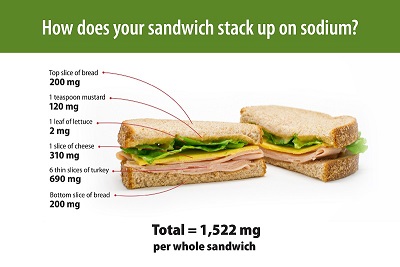Belly bloat can throw off your entire day and put a damper on a trip to the beach or pool. If you’re losing the bloating battle, some simple changes to your lifestyle can help. Here are a few suggestions from Los Angeles plastic surgeon George Sanders.
Avoid High-Sodium Foods
Our bodies need sodium, but not too much — only about ¼ teaspoon every day. Consuming too much sodium causes water retention and bloat (as well as other health problems).
What the Centers for Disease Control and Prevention Want You to Know about Sodium
More than 40% of the sodium we eat each day comes from only 10 types of food. Many people are surprised to learn which foods are on the list because the foods do not always taste salty.

Top Sources of Sodium1
- Breads and rolls
- Pizza
- Sandwiches
- Cold cuts and cured meats
- Soups
- Burritos and tacos
- Savory snacks*
- Chicken
- Cheese
- Eggs and Omelets
*Chips, popcorn, pretzels, snack mixes, and crackers
The 2015-2020 Dietary Guidelines for Americans recommend that Americans consume less than 2,300 milligrams (mg) of sodium each day as part of a healthy eating pattern.
Knowing which foods are the biggest contributors to sodium in your diet is an important step in reducing daily sodium intake to a healthy level. To figure out the amount of sodium in a food, check the Nutrition Facts label, which lists sodium content per serving. Sodium content is listed in milligrams (mg).
Drink More Water
It may seem counterintuitive to reduce water retention by drinking more water, but experts swear by it! When you’re not drinking enough water, your body holds on to what you do drink to stave off dehydration. Drinking more water helps your body release fluids. It also prevents constipation, which can lead to bloating.
Eat More Fiber
Speaking of preventing constipation, making certain dietary tweaks can help, too. Adding fiber is great for moving everything through the intestines more quickly. Eat more fiber-rich foods like fruits (especially pears, peaches and prunes), vegetables (especially broccoli and cabbage), whole grains and bran products. Air-popped popcorn is another smart option, as long as you avoid adding extra salt and butter, which lead to bloat.
Refrain from Drinking Alcohol
Alcohol leads to dehydration, which causes water retention and bloat. Many popular alcohol drinks have carbonated mixers, which can puff up the stomach. Practice moderation and limit yourself to one non-fizzy drink per day. Follow it up with a big glass of water.
Eat Slowly, Enjoying Each Bite
Eating too quickly can cause you to swallow air, which leads to bloating and gas. Enjoy your meal slowly and savor every bite. By eating slowly, you may feel full quicker.
Interested In Permanently Flattening Your Stomach?
Do you eat well, work out regularly and take good care of your body, yet still struggle with a flabby belly due to localized fat pockets? Dr. Sanders can help. He offers two safe and effective stomach-flattening procedures: liposuction and abdominoplasty (tummy tuck).
Liposuction is great for people with localized pockets of fat and relatively firm, elastic skin. Tummy tuck is a more comprehensive procedure that treats fat deposits, separated or loose abdominal muscles and excess skin. Dr. Sanders can evaluate your specific areas of concern and recommend the most suitable treatment option based on your needs.
To schedule an informational consultation with Dr. Sanders, please call (818) 981-3333 or email our practice today.






